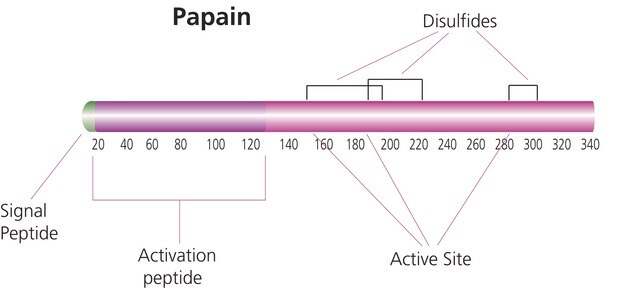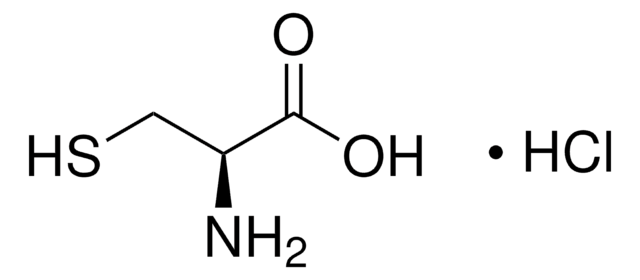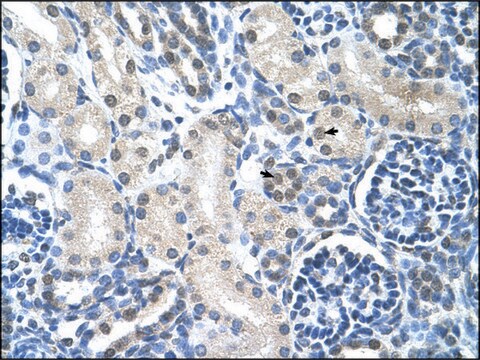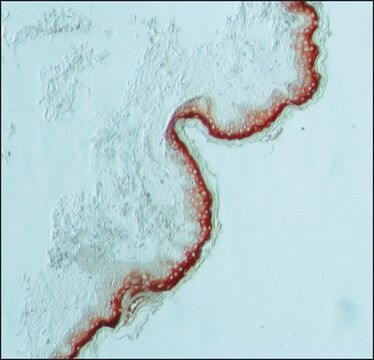GS74
GST M4-4, Recombinant Human
Sinónimos:
GTM4, glutathione S-transferase mu 4
Iniciar sesiónpara Ver la Fijación de precios por contrato y de la organización
About This Item
Código UNSPSC:
12352200
NACRES:
NA.55
Productos recomendados
origen biológico
human
Nivel de calidad
recombinante
expressed in E. coli
Ensayo
>95% (SDS-PAGE)
Formulario
frozen liquid
actividad específica
1.67 units/mg protein
mol peso
26 kDa
concentración
1.8 mg/mL
temp. de almacenamiento
−70°C
Información sobre el gen
human ... GSTM4(2948)
Descripción general
using spectrophotometric determination of 1-chloro-2,4-dinitrobenzene (CDNB) conjugation with reduced glutathione (1 mM) in 100 mM NaPO4 (pH 6.5) at room temperature.
Acciones bioquímicas o fisiológicas
Cytosolic and membrane-bound forms of glutathione S-transferase are encoded by two distinct supergene families. At present, eight distinct classes of the soluble cytoplasmic mammalian glutathione S-transferases have been identified: alpha, kappa, mu, omega, pi, sigma, theta and zeta. This gene encodes a glutathione S-transferase that belongs to the mu class. The mu class of enzymes functions in the detoxification of electrophilic compounds, including carcinogens, therapeutic drugs, environmental toxins and products of oxidative stress, by conjugation with glutathione. The genes encoding the mu class of enzymes are organized in a gene cluster on chromosome 1p13.3 and are known to be highly polymorphic. These genetic variations can change an individual′s susceptibility to carcinogens and toxins as well as affect the toxicity and efficacy of certain drugs. Diversification of these genes has occurred in regions encoding substrate-binding domains, as well as in tissue expression patterns, to accommodate an increasing number of foreign compounds. Multiple transcript variants, each encoding a distinct protein isoform, have been identified.
Glutathione S-transferase mu 4 (GSTM4) is an enzyme that in humans is encoded by the GSTM4 gene. Glutathione S-transferases (GSTs) are a family of enzymes that play an important role in detoxification by catalyzing the conjugation of many hydrophobic and electrophilic compounds with reduced glutathione. Based on their biochemical, immunologic, and structural properties, cytosolic and membrane-bound forms of glutathione S-transferase are encoded by two distinct supergene families. At present, eight distinct classes of the soluble cytoplasmic mammalian glutathione S-transferases have been identified: alpha, kappa, mu, omega, pi, sigma, theta and zeta. The GSTs are thought to function in xenobiotic metabolism and play a role in susceptibility to cancer, and other diseases.
Almacenamiento y estabilidad
The enzyme should be used by the end-user customer within 1 year of receipt.
Código de clase de almacenamiento
10 - Combustible liquids
Clase de riesgo para el agua (WGK)
WGK 1
Punto de inflamabilidad (°F)
Not applicable
Punto de inflamabilidad (°C)
Not applicable
Elija entre una de las versiones más recientes:
Certificados de análisis (COA)
Lot/Batch Number
¿No ve la versión correcta?
Si necesita una versión concreta, puede buscar un certificado específico por el número de lote.
¿Ya tiene este producto?
Encuentre la documentación para los productos que ha comprado recientemente en la Biblioteca de documentos.
A Iida et al.
Journal of human genetics, 46(10), 590-594 (2001-10-06)
A major goal in our laboratory is to understand the role of common genetic variations among individual patients as regards susceptibility to common diseases and differences in therapeutic efficacy and/or side effects of drugs. As an addition to the high-density
Jackie Denson et al.
Gene, 379, 148-155 (2006-07-21)
The glutathione S-transferase Mu class (GSTM) genes encode phase II metabolism enzymes that are involved in the detoxification of various carcinogens and drugs. Some genetic polymorphisms in GSTM genes are related to disease phenotypes and drug-metabolism differences in the population.
Nuestro equipo de científicos tiene experiencia en todas las áreas de investigación: Ciencias de la vida, Ciencia de los materiales, Síntesis química, Cromatografía, Analítica y muchas otras.
Póngase en contacto con el Servicio técnico






